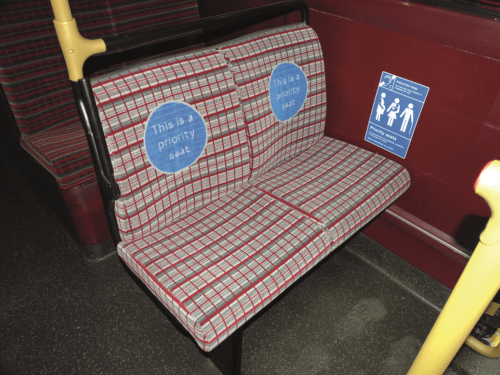
More than 300 TfL buses now have new priority seating designs, with the entire New Routemaster fleet to have new moquette by the end of 2025
TfL says it is making bus travel in the capital more attractive, inclusive and accessible to all users with new, more prominent priority seating on its buses. The operator made the claims as it held Priority Seating Week, which is intended to highlight the need to make travelling easier for people with a range of conditions whose need may not be immediately obvious.
One in five bus customers has a visible or non-visible condition, says TfL, and may need a seat while travelling on public transport, something which can prove a barrier to travel or make a big difference to someone’s day. The operator said it has been working to improve the comfort and quality of customers’ journeys by installing new priority seating across the bus network, featuring a more eye-catching moquette in distinctive colours and with a clear message showing it is a priority seat. More than 300 TfL buses now have the more prominent priority seating designs, which it says helps people who need a seat, including older and disabled customers and people with non-visible conditions, to easily identify these seats and serves as a reminder to fellow passengers that there may be customers with a greater need of a seat. Half of TfL-owned buses where new priority seat moquette has been installed are on routes serving outer London, the operator noted, which could make it easier for users to get a seat for what might be longer journeys.
Priority Seating Week
TfL’s Priority Seating Week, held at the end of last month and instigated in 2017, is a dedicated week of action to raise awareness of priority seats across the public transport network which are designed to make travelling easier and more comfortable for people with a range of visible and non-visible conditions. TfL said its new seating designs across its bus network build on the successful campaigns it has been delivering since it first launched Priority Seating Week in 2017. More than 100,000 ‘Please Offer Me A Seat’ badges have been issued to disabled people and those with non-visible conditions since the campaign was first launched, the operator reports, and new priority seating has also been introduced on London Overground and selected London Underground trains to encourage more users to think about passengers who might have a greater need.
Seb Dance, London’s Deputy Mayor for Transport, said: “Making the public transport network accessible for all is a top priority for the Mayor, and Londoners can play their part by offering their seat to those who need it. Buses are already our most accessible mode of public transport. This roll-out will provide even more priority seating on buses and we hope encourage everyone to think about their fellow passengers, helping us to build a better, fairer London for everyone. Not all disabilities are visible so, starting with Priority Seating Week, we’re asking all Londoners to be aware of this when travelling, and offer their seat to those who may need it more than them.”
Mark Evers, TfL’s Chief Customer Officer, added: “Priority Seating Week shows our commitment towards making travelling on the public transport network easier and more pleasant for everyone, especially for customers with visible and non-visible conditions. This new striking priority seat moquette on buses is designed to make these seats more obvious to people who need them and serves a reminder to others to offer their seat to those who may need it more.”
Age UK London’s Campaigns Manager John McGeachy welcomed the initiative: “Age UK London has been pleased to support TfL’s Priority Seating Week for several years and we’re excited about this year’s focus on the bus network,” he said. “Making travel as easy as possible can transform lives. Too many older Londoners experience anxiety before getting on board a bus and concerns about being able to sit down can be a big part of that. It’s great to see increasing awareness of initiatives such as ‘Please Offer Me A Seat’ badges but there is always more to do and so we really welcome the installation of new priority seating and the new designs.”
Preliminary research undertaken by TfL on refurbished New Routemaster buses found that the new priority seat moquette design has improved the quality of journeys for customers. TfL said that 100% of priority seat users can now easily recognise them, with more than half of all passengers saying their journey experience has improved as a result of the priority seat moquette. Three in five non-users of priority seating on refurbished buses said they are able to recognise the benefits and importance of the new moquette for others who require them. With the improvements, customers travelling on the refurbished buses were also found to be the most satisfied with their journeys with 95% saying they will use that bus again.
TfL said that more than a quarter of the new priority seat moquette has been installed on its New Routemaster buses, and the remainder of the fleet will be completed by the end of 2025. Other proposed accessibility and safety improvements on buses include enhancing bus ramps by adding upstands to both edges of the ramp as part of new bus safety standard to better guide ramp users onto and off the bus, part its commitment to invest in delivering an accessible and inclusive bus network as outlined in the TfL Bus Action Plan, Action on Inclusion Strategy and the Mayor’s Transport Strategy.

